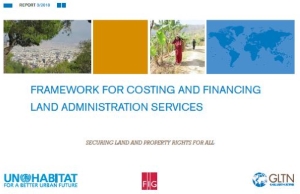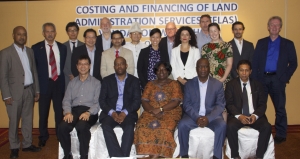News in 2018

|
Framework for Costing and Financing Land Administration Services -
CoFLAS
October 2018
Launch of UN-Habitat/GLTN and FIG report
UN-Habitat/Global Land Tool Network (GLTN) and FIG have published a
new report. The costing and financing of land administration services
(CoFLAS) directly addresses one of the 18 core land tools identified by
GLTN: “modernizing the land agencies’ budgetary approach”.
 |
It is essential for FIG, as a long-term partner of GLTN, to
steer and involve in the development of tools together
with GLTN and other GLTN partners. FIG Honorary PresidentTeo
CheeHai has had a central convening and leadership role
from the first initiative until this final report. The guide
provides a practical implementation guide that accompanies the
overarching Framework for Costing and Financing Land
Administration Services (CoFLAS) tool document.
|
The process
The development of the CoFLAS tool involved comprehensive case
research work and extensive consultations. The first Experts Group
Meeting (EGM) was hosted by Kadaster in Rotterdam, Netherlands in May
2013, followed by another EGM which was hosted by Lantmäteriet in Gävle,
Sweden in October 2013. The first version of the tool was released at
the FIG congress in Kuala Lumpur in June 2014 and validated in another
EGM in Bangkok, Thailand in October 2014, organised by FIG. These
milestones further triggered a series of consultations and validation
exercises by the various land experts and members of the Advisory Group.
The Use of CoFLAS
CoFLAS is essentially a decision-support tool for land
administration. It prompts discussion on a country’s readiness for land
reform and provides a series of templates to assist public agencies to
identify the core needs and necessary investment for land reform
processes. The outcome of a CoFLAS assessment is a series of reports
that guide decision making related to land reform, identify the
cost-implications of decisions and support fit-for-purpose approaches.
The Global Land Tool Network (GLTN) is committed to promoting
pro-poor land policies, legislative processes, land administration
systems and procedures. The outcome of a CoFLAS assessment is a series
of reports that guide decision making related to land reform, identify
the cost implications of decisions and support fit-for-purpose
approaches. This Framework provides a practical implementation guidance
for implementing land administration reforms particularly in developing
countries.
Kadaster
(the Netherlands), Statens Kartverk (Norwegian Mapping Authority,
Cadastre and Land Registry), Lantmäteriet (Sweden), Danish Geodata
Agency and Land Information New Zealand (LINZ) have provided valuable
political and technical inputs in the development of the framework.
Authors of the final version of the tool book are Tony Burns and Kate
Fairlie, Land Equity International.

Group photo from the EGM meeting in Bangkok, Thailand, October
2014 |
FIG would like to acknowledge Teo CheeHai for the substantial
work he has provided over the years, both during his term as
President of FIG and hereafter in the development of this tool
that has now been published.
A special thanks to GLTN staff, other partners, FIG
representatives and participants at the expert group meetings
for the fruitful and inspiring cooperation over the years on the
tool.
|
It is the hope of FIG that
this tool will be used by many around the world.
Read the report
Louise Friis-Hansen
11 October 2018


























